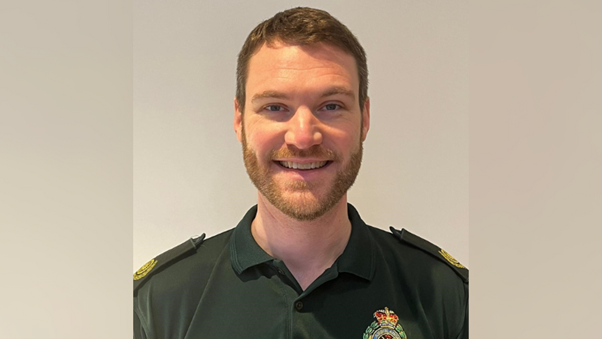
Resilience Manager Nick Bell has been part of our North West Ambulance Service (NWAS) family since 2018 but his life in the ambulance service started long before that. Over his 20 years’ service, Nick has worked in all areas of the ambulance service. He told us, “In 2003 I joined London Ambulance Service as an emergency medical dispatcher in the Emergency Operations Centre (EOC) aged 18. I had always known I wanted to do something that involved helping people. School didn’t go quite as expected for me, meaning I left early and joined EOC prior to being able to do a trainee ambulance technician course which I completed in 2005. I progressed to being a paramedic in 2009 and joined NWAS in 2018 when I relocated north with my husband, working first in the Clinical Hub and now in the Resilience Team.”
Starting a new job is daunting for everyone but Nick has described how for some LGBT+ people, the pressure of coming ‘out’ every time they start somewhere new can be hard. However, as a result of Nick’s school years, he has learned not to let it phase him. He said, “Being bullied in school about my sexuality contributed to me leaving school early. I made the decision quite quickly after leaving that I’d never apologise or hide my sexuality again. As such, within the first few days of training and once operational within the EOC I was out, something I’ve continued throughout all my ambulance service roles. It’s tiring having to come out again and again when you’re getting to know new colleagues but it’s something I’ve accepted and I can see that, since my childhood, it has improved.”
Over the years and the countless times Nick has ‘come out’, he has had to prepare himself for what reaction he will receive. When asked about what reactions he has had in the past, he said, “The vast majority have been positive, or ideally, haven’t made a big deal and have just continued with the conversation or task we’re doing. Not within NWAS, but at other ambulance services, I’ve had immediate negative reactions with people telling me they “don’t agree with my lifestyle choice”, like this is something I chose. I was definitely born gay, so I don’t even entertain this idea.”
Working within an organisation and with colleagues that treat everyone equally is what is expected of every working environment. When asked about NWAS, what we are like as an organisation and what we can do better, Nick said, “NWAS is an inclusive and supportive organisation. I’ve met supportive staff across all levels of NWAS and I know we have an active LGBT+ network which is really positive. I think our public involvement with numerous Pride events shows the support we want to give to our staff and our communities. But with everything, I think there is always more we can do, in NWAS and the wider NHS. Staff continuing to tell their stories, especially around the pressure of coming out again and again, helps keep visibility high so when someone does come out or drops a comment into the conversation, it is treated as routine with no big surprise. I think for LGB people, as positive awareness has increased helped by important moments such as the Equality Act and equal marriage, barriers have lessened. People are less surprised by someone coming out, however, it’s obvious that there is still a lot of ignorance and barriers for trans people. This is very sad. In my opinion this is the biggest barrier that needs work.” Nick doesn’t just advocate equality for the LGBT+ community in work, outside of his NWAS role he volunteers with Diversity Role Models going into secondary schools across the North West helping deliver workshops about what being LGBT+ is like. He explained, “Talking to school children about my personal life story from school to my current situation helps break down barriers. I can see in schools things have changed significantly for the better since the era I grew up in but barriers do remain with high levels of homophobic slurs almost normalised. Meeting real LGBT+ working professionals at school can have a real impact on kids. I’ve since seen some educate their parents on LGBT+ matters, parents who were never told about our community in a positive light. I firmly believe this is the right way to achieve better results and a more understanding and accepting population.”